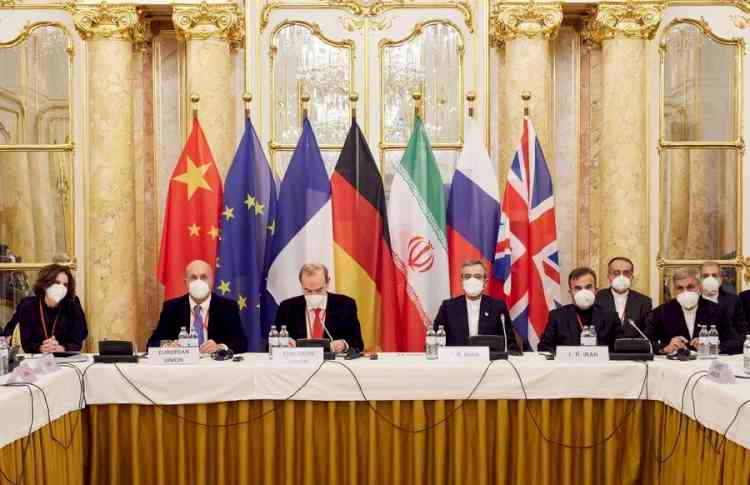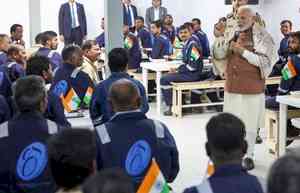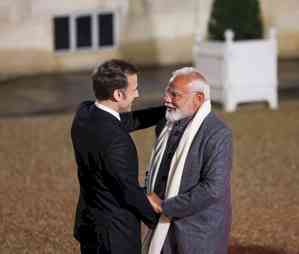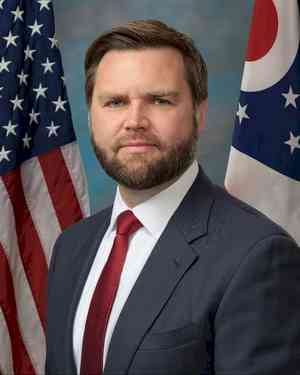Iran's proposals lead to pause in Vienna nuke talks, mounting uncertainty

Tehran, Dec 5 (IANS) The talks aimed at reviving the 2015 Iranian nuclear deal was adjourned in Austria's capital Vienna, after which diplomats returned to their capitals for consultations before they will reconvene next week.
Senior diplomats from the UK, France, and Germany on Friday expressed "disappointment and concern" at the latest proposals from Iran. These developments, analysts say, have led to the suspension of the meeting and mounting uncertainty for future talks, Xinhua news agency reproted.
"It was emphasised that the proposals of Iran on the removal of illegal and oppressive sanctions and the nuclear issue are on the table," Iran's top nuclear negotiator Ali Bagheri Kani told Iranian media on Friday in Vienna.
Since the European representatives needed to consult with their capitals for a "documented and reasonable response" to these proposals, it suggested that the talks be suspended for a few days, he was quoted by Iranian news network Press TV as saying.
The response from other sides to Iran's proposals would be the base for further negotiations, Bagheri Kani said, adding the European parties were not "satisfied" with some parts of Iran's proposes.
After "thoroughly and carefully" analysing the proposals by Iran's new delegation, senior officials from the three European countries said in a Friday statement that Iran "has backtracked on the diplomatic progress made" by demanding "major changes," some of which were incompatible with the 2015 accord, formally known as the Joint Comprehensive Plan of Action (JCPOA).
However, Iranian media reported that Iran's proposes are "in full conformity with the JCPOA and the principles contained therein", citing an informed source familiar with the Vienna talks.
It is "unclear how these new gaps can be closed in a realistic time frame," European diplomats said.
These "new gaps" between the European countries and Iran are a continuation of their different opinions about the texts negotiated during the previous six negotiating rounds.
The three European parties want Iran to agree to restart talks from where they left off in June, while Iran's negotiators reiterated that the texts of the previous rounds of talks were only "drafts" and thus they are not legally binding for Iran.
In a more optimistic tone, when commenting on the achievements in the past days, EU representative Enrique Mora, who chaired the Vienna meetings, told reporters on Friday that there had been progress "in the sense that we have had a new Iranian delegation."
Similarly, the talks helped other parties to increase their understanding of the position of the negotiation team of Iran's new government, Wang Qun, Chinese envoy to the UN and other international organisations in Vienna, explained on Friday.
The presentation of two proposal documents is "clear and convincing proof" that Iran has entered the Vienna negotiation process, not only by sending a full expert team, but also with a presentation of "groundbreaking initiatives," said Nour News, which is affiliated with Iran's Supreme National Security Council.
However, the Western countries present at the talks "did not put any initiative on the table and practically slowed down the negotiation process," said the news website of Iran's top security body.
"It seems we must, as in the past, wait for the intensification of the Western blame game against Iran," it warned.
"What we have seen in the last couple of days is that Iran right now does not seem to be serious about doing what is necessary to return to compliance, which is why we ended this round of talks in Vienna," US Secretary of State Antony Blinken said after the Vienna talks paused on Friday.
Washington would pursue "other options" if the diplomatic efforts failed, he warned.
The blame game between Iran and the West has continued for months, with the word "serious" turning a major bone of contention, especially during the past tense days since the talks resumed on Monday. Iran and its Western negotiating partners have repeatedly complained about each other's foot-dragging in the negotiations.
Washington even hinted that Iran tries to "drag out this process while continuing to move forward inexorably in building up its nuclear program." However, Tehran said it has entered the Vienna talks in earnest, and that a "good deal is within reach if the West shows "good will."
In his Friday phone conversation with EU Foreign Policy chief Josep Borrell, Iranian Foreign Minister Hossein Amir Abdollahian described the process of talks as "good though slow".
He said the West must also offer its own initiative to end the sanctions against Iran and end its previous slogans that violated the rights and interests of the Iranian people.
"We believe that a good deal is at hand, but it requires a shift by some parties away from the language of threat to the language of cooperation and mutual respect," he added.
Notably, objections against the nuclear talks have also added to tensions and likely complicated the negotiating process.
According to US media, a group of 25 Republican members of Congress has recently written a letter to President Joe Biden, pledging to block any sanctions relief for Iran, and re-asserting the power of Congress to impose sanctions on Iran.
In Iran, because the 2015 agreement failed to provide the economic boost Iran had hoped for, and the US unilaterally withdrew from the accord in 2018 and re-imposed sanctions against Iran, some hardliners have cast doubt on the nuclear negotiations and tried to hinder the government from making major compromises.
Meanwhile, Israeli Primer Minister Naftali Bennett on Thursday urged an "immediate halt to negotiations" with Iran and "the implementation of tough steps by the world powers" against Iran in a phone call with Blinken, Bennett's office said in a press release.
Israeli media reported on Monday that the Israeli government has been contacting US and European officials over the past two weeks to provide its alleged intelligence that Iran would be taking steps to enrich uranium at a weapons-grade degree of purity.
Iranian Foreign Ministry Spokesman Saeed Khatibzadeh said on Thursday that "delegates in Vienna will not take instruction from Beit Aghion." Beit Aghion, or Aghion House, refers to the official residence of the Israeli prime minister.
"As #ViennaTalks advances, Israeli regime shows its true color again, calling for immediate halt of negotiations," Khatibzadeh tweeted.
Also, in his remarks to the press on Thursday, Bagheri Kani said he warned his JCPOA counterparts on Wednesday about "the outlook and approach of actors outside the talks to negatively affect the negotiation process."


 IANS
IANS 










